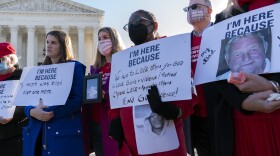Krishnadev Calamur
Krishnadev Calamur is NPR's deputy Washington editor. In this role, he helps oversee planning of the Washington desk's news coverage. He also edits NPR's Supreme Court coverage. Previously, Calamur was an editor and staff writer at The Atlantic. This is his second stint at NPR, having previously worked on NPR's website from 2008-15. Calamur received an M.A. in journalism from the University of Missouri.
-
The U.S. Court of Appeals for the Federal Circuit granted the Trump administration's request to temporarily put on hold the New York-based Court of International Trade judgment that struck down President Trump's tariffs.
-
The ATF says bump stocks convert a semi-automatic weapon into a machine gun by firing multiple rounds with a single pull on the trigger. Machine guns have been banned under federal law since 1934.
-
Members of the congressional progressive caucus have withdrawn a letter urging President Biden to adjust his approach to the war in Ukraine.
-
It's the first major gun case at the court since 2008, when the court ruled that the Second Amendment right to keep and bear arms grants individuals the right to keep a gun at home for self-defense.
-
In arguments Monday, the court heard challenges from the U.S. Justice Department and abortion providers over the controversial law that has the effect of banning most abortions in Texas.
-
The Justice Department wants the high court to put the restrictive law on hold during ongoing legal challenges. The U.S. government says the legislation is unconstitutional.
-
But a majority of the court appeared inclined to defer to the government's position that the release of information on Abu Zubaydah's treatment would hurt national security.
-
The justice has been vaccinated since January. As a result of his positive test, he will not attend Justice Amy Coney Barrett's investiture ceremony.
-
On Dec. 1, the court will hear arguments in Dobbs v. Jackson Women's Health Organization. The Mississippi case tests whether all state laws that ban pre-viability abortions are unconstitutional.
-
"If the Democrats can do it, the Republicans can do it," Supreme Court Justice Stephen Breyer told NPR's Nina Totenberg.









